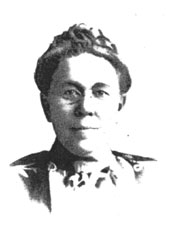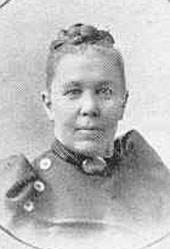
Eliza Jane Read Sunderland (April 19, 1839-March 3, 1910), the wife of a prominent Unitarian minister, was a church leader, innovative religious educator, prominent reformer, and a popular lecturer. She was one of the first women in the United States to head a public secondary school and led the way for women who followed her to become professors at public Universities. A scholar of world religion, she advocated the broadest possible church, one that she hoped would in time encompass all people.
Eliza Read was born on a farm near Huntsville, Illinois in pioneer conditions. Her father, Amasa Read, a Quaker from Uxbridge, Massachusetts, died when she was very young. Her mother, Jane Henderson, who came from Ohio and was of Scottish descent, worked hard to run the farm by herself in order to enroll her daughter and two sons in good schools. Following a brief education at Abingdon Seminary in Abingdon, Illinois, Eliza began her teaching career at a district school at the age of fifteen. Men who had attempted to teach there before her had been driven out. She was nevertheless able to earn the respect of students much older than herself and to maintain order in the classroom.
Eliza attended Mount Holyoke Seminary in South Hadley, Massachusetts, 1863-65. After graduation she taught Latin, English literature, and history at the high school in Aurora, Illinois. In 1867 she became its principal. The state superintendent thought her “one of the very best teachers in the West” and “the Aurora High School under her organization and management . . . the very best school of the kind that I ever saw.” Upon her marriage in 1871 to Jabez Thomas Sunderland, a Baptist minister from Milwaukee, Wisconsin, however, she gave up her position as principal.
Originally a Baptist like her husband, Eliza had her own independent thoughts about religion. In 1872 the Sunderlands became Unitarians. Jabez’s first Unitarian settlement was in Northfield, Massachusetts, 1872-76.
Three children—Gertrude, Edson, and Florence—were born during the early years of the Sunderlands’ marriage. Edson Read Sunderland later became Professor of Law at the University of Michigan.
While Jabez was settled in Chicago, Illinois, 1876-78, Eliza resumed teaching. She taught high school for five years after the family moved to Ann Arbor, Michigan in 1878. She then did five years of graduate study in philosophy and psychology at the University of Michigan, earning a Ph.D. in 1892. Her dissertation was “The Relation of the Philosophy of Kant to that of Hegel.” During her student years, as she was able to earn enough money, she traveled extensively through Europe and the Middle East with her husband and children.
In 1894 graduate students at the University of Michigan organized a petition to have women appointed to faculty and, in particular, to have Sunderland made Assistant Professor of Philosophy. Although the petition was not successful, she continued an influential, if informal, role at the university, addressing the community, teaching a Bible class, and counseling students, especially the women. She acted as a role model and brought spiritual insight to students concerned with religious problems.
Sunderland taught a Bible class at the University of Michigan for 17 years. There was a consistent attendance of well over a hundred at her lectures, which were considered a model of adult religious education. She taught her students not only a critical appreciation of the Bible, but also church history, the history of Unitarianism, modern theology, and non-Christian religion.
During her years at Ann Arbor, 1878-98, Sunderland took a leading role in both the local Unitarian church and in denominational affairs, working effectively in tandem with her husband. She preached often and eloquently both in Jabez’s pulpit and at other Unitarian and Universalist churches. Having an especial dislike of the doctrine of eternal punishment, she identified with Universalists and believed that the two faiths ought to be united. She preached a religion based not on creed but on a broad conception of religious faith and ethics, which she detected in the remains of ancient civilization and which she saw as potentially uniting all peoples in a common ideal. “If you direct your appeal to one creed or religion you will have but a limited audience,” she preached. “If you direct your appeal to the heart and the conscience, no walls can contain your audience.”
Along with her husband Sunderland took part in the Western Unitarian controversy in the 1880s. Although her religious sympathies were broad, she could not abide a local Unitarian minister, Rowland Connor, a member of the Free Religious Association, whom in 1885 she accused of disbelief in God, religion, and immortality. The Sunderlands’ call for an explicitly theistic standard in the Western Unitarian Conference ushered in a period of crisis within the conference that lasted until 1892, when a compromise measure proposed by Jabez Sunderland was accepted.

At the World’s Parliament of Religions and Columbian Exposition’s Women’s Congress, 1893, Sunderland represented Unitarian women of America. In her Parliament speech, “A Serious Study of All Religions,” she defined religion as “a feeling out after a bond of union between the human and the divine” and claimed that the study of all religions was “necessary to the intelligent comprehension of any one religion.” She expounded an evolutionary view of religions, trusting that Christianity, with its capacity to change and grow, had become “one ideal large enough to include all peoples, tender enough to comfort all, lofty enough to inspire all.” According to the Chicago Tribune, “Three thousand people in the Hall of Columbus stood up and cheered and applauded the remarkable address of Mrs. Eliza R. Sunderland. Hers was the clearest and most eloquent voice in all the great parliament of religions yesterday.”
Sunderland spoke often outside churches, addressing educational, temperance, and women’s organizations. She was one of the most prominent advocates in Michigan of education, employment opportunities, and the vote for women. She was a principal organizer of the Women’s Western Unitarian Conference, of which she was President, 1882-87; and she was a director, 1885-95, and vice-president, 1886-91, of the National Society for the Advancement of Women.
Although she published only one book, James Martineau and His Greatest Book, 1905, co-written with her husband, Sunderland wrote many magazine articles and a number of pamphlets and tracts. She wrote often on education and religious education and gave lectures on literary topics, notably on Henrik Ibsen and Robert Browning. She was associate editor of the Illinois Social Science Journal, 1878.
Later in life the Sunderlands lived in Oakland, California, 1898-99; Toronto, Canada, 1900-06; and Hartford, Connecticut, 1906-10. In Hartford, Eliza was a member of the Board of Education, 1907-10, and an advocate for education at meetings of the state legislature. She died in 1910 at Hartford, twenty-four years before the death of her husband. “I should have been glad for a few more years of work,” she said on her deathbed. “But I am content: it is all right as it is, exactly right. I have been given a very beautiful life. If this is death, then it is beautiful too.”
Sources
The Eliza Jane Read Sunderland papers, covering the years 1865-1910 and including articles, lectures, sermons and letters, are at the Bentley Historical Library at the University of Michigan in Ann Arbor, Michigan. Sunderland’s correspondents included Augusta Chapin, Robert Collyer, Caroline Crane, John Dewey, Samuel A. Eliot, William Channing Gannett, Julia Ward Howe, Jenkin Lloyd Jones, and Lucy Stone. Among her short published works are Stories from Genesis (1881), Heroes and Heroism (1882), Religious Study Classes (1885), and The Bible: Passages from Various Authors Selected (n.d.). Among the contents of Jabez T. Sunderland, “A Ministry of Twenty Years in Ann Arbor Michigan; Sermons and Pamphlets,” at the University of Michigan library, are several items by Eliza Sunderland: Miracles, God, Thomas Hill Green, and Dr. Martineau’s Study of Religion.
Entries on Eliza Sunderland appeared in Who’s Who in America (1910-1911) as well as in the 1928 edition of the Dictionary of American Biography. The most substantial account of her life is Jabez T. Sunderland, Eliza Read Sunderland; a Brief Sketch of Her Life: Memorial Addresses (n.d.). There is also a brief entry in F.E. Willard and M.A. Livermore, American Women (1897) and another in Eric J. Ziolkowski, editor, A Museum of Faiths: Histories and Legacies of the 1893 World’s Parliament of Religions (1993). The latter includes most of the text of Sunderland’s lecture “A Serious Study of All Religions.” The full text is in John Henry Barrows, The World’s Parliament of Religions, vol. 1 (1893). The newspaper report on Sunderland’s lecture is in the Chicago Tribune (September 16, 1893). See also Richard Seager, The World’s Parliament of Religions: The East/West Encounter (1995) and M.K. Eagle, The Congress of Women, World’s Columbian Exposition (1894), vol. I. Obituaries are in the Christian Register (March 10, 1910) and the Hartford Courant (March 4, 1910).
Article by Spencer Lavan
Posted August 11, 2003